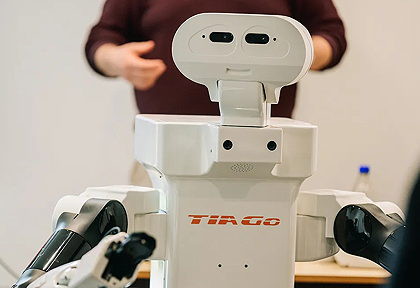Scottish researchers’ slice of £117m funds will make robots safer

Robotics and AI (artificial intelligence) experts at Heriot-Watt University and the University of Edinburgh have secured funding for a training centre to help make robots safer, more dependable and trustworthy.
The UKRI Centre for Doctoral Training in Dependable and Deployable Artificial Intelligence for Robotics (CDT-D2AIR) will train PhD students in verification and certification systems for robotics and AI.
The aim is to ensure that robotics applications in industry and the home – including those used in manufacturing and construction – can interact safely with the environment and with users.
The centre has been awarded a share of £117m of funding announced by UK Research and Innovation (UKRI) – the UK’s national funding agency for science and research – and is one of 12 new Centres for Doctoral Training announced by the Department for Science, Innovation and Technology in the run up to this week’s AI Safety Summit 2023.
The D2AIR Centre for Doctoral Training will be based at the Edinburgh Centre for Robotics (ECR), a joint initiative between Heriot-Watt University and the University of Edinburgh. ERC includes the National Robotarium, at Heriot-Watt’s Edinburgh campus, and the Bayes Centre, the University of Edinburgh 's Innovation Hub for Data Science and Artificial Intelligence. These centres include robotic testing and development facilities and more than £20m of robotic equipment.
Students working in the D2AIR Centre for Doctoral Training will be able to simulate and test systems, and will be trained in the latest methods in AI, verification, design and robotics.
“There is a clear need for robotics and AI systems be certifiable, reliable and capable of interacting safely with people and the environment,” says Professor Ron Petrick, professor of Computer Science at Heriot-Watt University, who has been appointed director of the new Centre. “While AI methods are being increasingly used in robotics, much of this technology was not originally designed with safety and other important human-centred requirements in mind. Making AI truly applicable to, and deployable in, robotic solutions will require advanced sets of skills and a new way of thinking.”
Petrick points out that manufacturing and construction robots that can sense and interact with their environment have to work in challenging and extreme environments. “The safety of autonomous systems is key to their deployability, especially when they need to operate around people.”
He adds that D2AIR will build a new talent pipeline of graduates who can think in new ways about researching, designing, building and deploying dependable and safe robot systems. “This pipeline will increase productivity, catapulting the UK as a world-leader in trustworthy robotics and AI technologies,” he predicts.

The £117m of UKRI funding will go to 12 Centres for Doctoral Training in Artificial Intelligence at 16 universities. The investment will help to train the next generation of AI researchers across the UK. It builds on a previous UKRI investment of £100m in 2018.
“The UK is at the very front of the global race to turn AI’s awesome potential into a giant leap forward for people’s quality of life and productivity at work, all while ensuring this technology works safely, ethically and responsibly,” says Michelle Donelan, UK Secretary of State for Science, Innovation and Technology. “The plans we are announcing will future-proof our nation’s skills base, meaning we can reap the benefits of AI as it continues to develop. At the same time, we are taking the first steps to put the power of this technology to work, for good, across Government and society.”
“The UK is in a strong position to harness the power of AI to transform many aspects of our lives for the better,” adds UKRI chief executive, Professor Dame Ottoline Leyse. “Crucial to this endeavour is nurturing the talented people and teams we need to apply AI to a broad spectrum of challenges, from healthy aging to sustainable agriculture, ensuring its responsible and trustworthy adoption.”
The £117m investment will involve multiple business and institutional partners including IBM, Astra Zeneca and Google, as well as SMEs that are innovating in the field of AI. A further £110 million is coming from the partners in the form of cash or in-kind contributions, such as use of facilities, resources or expertise.
National Robotarium: Twitter LinkedIn





